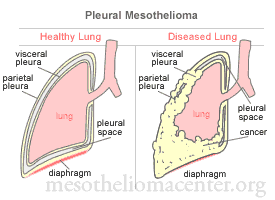Pleural Mesothelioma
 Malignant pleural mesothelioma is the most common type of mesothelioma, making up over two-thirds of all cases. Pleural mesothelioma affects the lining of the lung and chest cavity known as the pleura.
Malignant pleural mesothelioma is the most common type of mesothelioma, making up over two-thirds of all cases. Pleural mesothelioma affects the lining of the lung and chest cavity known as the pleura.
The pleura is is the membrane that surrounds the chest and lungs. This membrane, known as the mesothelium, lines several body cavities. While the pleura surrounds the lungs, cancer of the pleura is not actually lung cancer (which may also be caused by asbestos exposure).
Pleural mesothelioma, like all kinds of mesothelioma, can be difficult to diagnose or easily misdiagnosed. If you are aware of prior asbestos exposure, it is important to inform your physician so that mesothelioma symptoms can be correctly identified.
While a diagnosis of pleural mesothelioma is certainly serious, it is not without options. A variety of new and novel mesothelioma treatments are available, as are a variety of clinical trials.
Causes of Pleural Mesothelioma
Asbestos causes pleural mesothelioma. Used in a variety of industrial and construction applications, asbestos fibers are small, lightweight, strong, and easily airborne.
Once in the air these fibers are easily inhaled or injested, their size and sharp shape makes it easy for them work their way into the smallest passageways of the lungs and then into the pleura. Asbestos fibers thwart the body's natural defenses. Whether it is the sharp shape of the asbestos fibers, an unknown chemical reaction, or a combination of both these factors that cause the mesothelial cells of the pleura to become abnormal and divide without control is unknown. The connection, however, between asbestos and pleural mesothelioma has been clear since the begining of the 1960s.
Asbestos is the single largest cause of occupational cancer in the US1. In addition to pleural mesothelioma, asbestos causes lung cancer, other forms of mesothelioma, including peritoneal mesothelioma, and it is linked to several other types of cancer such as colon, stomach, throat, and laryngeal cancer.
In addition, absestos causes several non-cancerous conditions such as asbestosis, pleural effusions, pleural plaques, and pleural thickening (also known as pleural fibrosis). The majority of those diagnosed with these non-malignant conditions do not develop mesothelioma. However, the asbestos exposure levels associated with these conditions is an important factor to take into account when considering your risk of developing pleural mesothelioma.
Pleural Mesothelioma Symptoms
"Do I have pleural mesothelioma?" If you have been asking yourself this question, chances are you have a history of asbestos exposure.
Pleural mesothelioma's symptoms are not specific, and may indicate other, less serious, conditions. However, if you know you have a history of asbestos exposure, it is wise to be proactive regarding your health care choices and observant of potential symptoms of pleural mesothelioma. Have regular check ups with your physician and make sure he or she is aware of your concerns and your history of asbestos exposure.
Pleural mesothelioma is a dose-dependent disease, meaning that the longer and more heavily your exposure to asbestos, the greater the chance you have of developing pleural mesothelioma (or another type of mesothelioma). This dose-dependence can also affect how quickly you are diagnosed with pleural mesothelioma, although the disease is known for its long latency periods of 10, 20, even as many as 40 years from exposure to disease progression.
Symptoms of Pleural Mesothelioma
Symptoms of pleural mesothelioma may include, but are not limited to:
- Breathlessness (dyspnea)
- Along with shortness of breath, patients may suffer from a cough. Rarely, patients may develop hoarsness or cough up blood (hemoptysis).
- Chest pain
- Chest pain is often nonspecific, and may sometimes be felt in upper abdomen, shoulder, or arm. Chest pain and breathlessness are the most common, and usually earliest presenting, symptoms of pleural mesothelioma
- Weight Loss
- Unexplained weight loss is cited as a symptom in about a third of pleural mesothelioma cases.
- Pleural effusion
- A pleural effusion is the result of too much fluid building up between the parietal and visceral pleura (linings of the chest and lungs, respectively); a pleural effusion may cause chest pain and difficulty breathing (dyspnea), however, many cause no symptoms and are first discovered during the physical examination or seen on a chest x-ray.
- Night sweats
- Less common, but still cited enough to be considerd a symptom of pleural mesothelioma are fever, chills, and night sweats.